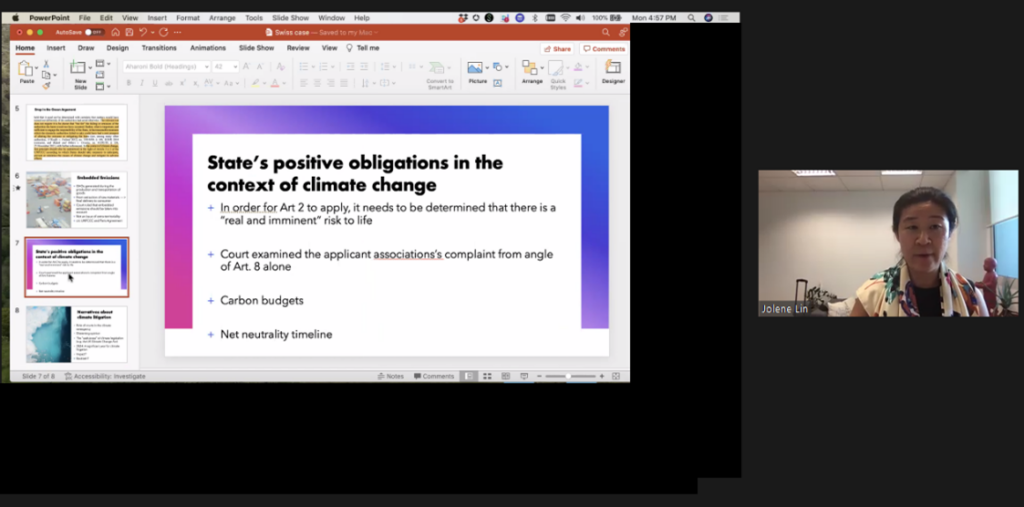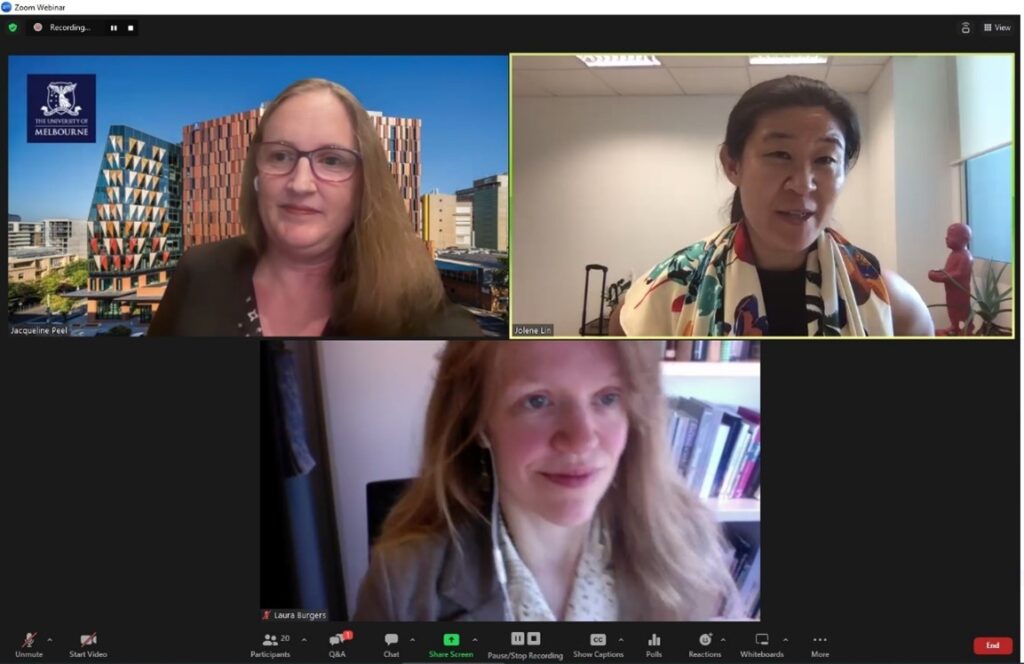Media - News
- Media
- Webinar on the ECHR Climate Change Rulings and their Global Significance
Webinar on the ECHR Climate Change Rulings and their Global Significance
On 29 April 2024, APCEL held a webinar discussing the landmark decision by the European Court of Human Rights (ECtHR) ruling that Switzerland had failed to comply with its duties to act on climate change.
We had the pleasure of hearing from three climate litigation experts: Dr Laura Burgers, Assistant Professor at the Amsterdam Centre for Transformative Private Law (ACT); Dr Jacqueline Peel, Director of Melbourne Climate Futures and Professor at Melbourne Law School; and Dr Jolene Lin, Director of APCEL and Associate Professor, NUS Law.
Dr Burgers gave an overview of the ECtHR case involving Switzerland. In the case, the elderly women sued Switzerland were alive and their health was impacted by heat waves. An association established to ensure effective climate protection for older women (Verein KlimaSeniorinnen Schweiz) also sued Switzerland.
Dr Burgers shared Article 8 of the ECHR, which protects the right to respect for private and family life, could apply to family reunification and extreme weather events. While the ECtHR laid obligations for states to comply with, such obligations were general – for instance, that states must set out intermediate targets. The ECTHR did not specify what targets Switzerland or states must meet. This is in line with the principle of “margin of appreciation”, where states have the choice of means to achieve the objectives of combatting climate change.

Dr Burgers explaining the ECtHR ruling against Switzerland
Dr Lin started her presentation by pointing out how the ECtHR sought to distinguish climate change from the typical environmental issues that the courts have had to adjudicate in the past such as toxic pollution accidents. There is no single or specific source of greenhouse gases, and the chain of effects is relatively unpredictable when it comes to global warming. This was the starting point for the court’s position that climate change required a different approach while being rooted in the ECHR environmental jurisprudence.
The ECtHR held that states have the obligation to consider embedded emissions in determining their carbon budgets. Embedded emissions refer to those produced during the entire life cycle of a product from the stage of extraction/manufacturing all the way to transportation. For a country like Switzerland which is heavily reliant on imported goods, its carbon footprint will be significantly larger if embedded emissions are included in the calculation. Currently, the international climate change legal regime takes a production-based approach to attributing emissions. A product that is made in China will have its emissions associated with its production attributed to China, regardless of whether the product ends up being consumed in Switzerland or Singapore. By ruling that embedded emissions ought to be taken into account by a State in determining its climate policies, the ECtHR is putting a spotlight on an important issue that has been overlooked thus far in international and domestic climate regulation. However, this also raises interesting questions of how this approach squares with international law and how states are to reduce their embedded emissions if these emissions must be reduced to stay within an acceptable carbon budget.

Dr Lin sharing on states’ obligations to mitigate climate change
Dr Peel shared that the ECtHR climate rulings may be indicative of a trend towards petitioners increasingly employing rights claims in climate change lawsuits and the growing receptivity of courts to this framing.
The ECtHR ruling against Switzerland is of global significance, being the first international climate ruling. While the ruling applies to a state, the reasoning is readily applicable to the situation of large corporate emitters. In particular, the ECtHR recognised climate change as creating compelling, present-day conditions, confirmed by scientific conditions, that could not be ignored.
Globally, climate litigation cases are continuing to grow and extend to new jurisdictions, with strategic cases against companies increasing in proportion.

Dr Peel sharing about the global trends on climate litigation
The speakers then took some questions from the audience. The webinar ended on a forward-looking note, with the audience pointed to an upcoming case in the South Korean constitutional court filed by fetuses, which places our future generations at the centre of our fight against climate change.

Dr Peel, Dr Lin and Dr Burgers engaging in Q&A
The speakers’ slides can be viewed at the links below:
- Presentation slides by Dr Jolene Lin
- Presentation slides by Dr Jacqueline Peel

